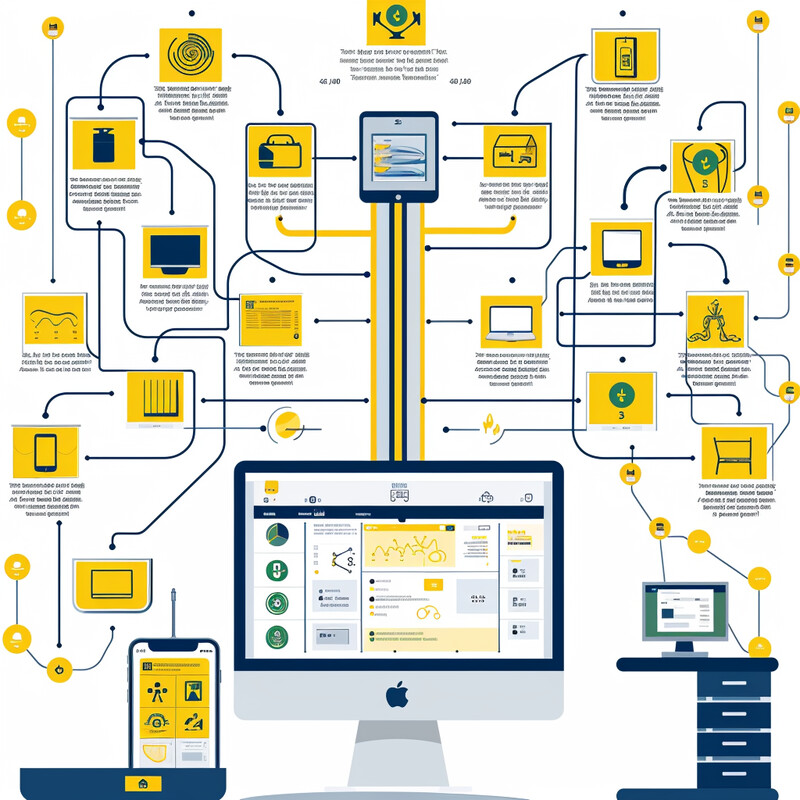1. Dynamic Pricing Models
AI-driven dynamic pricing adapts auction start prices and bid increments based on demand and bidder behavior. In auctions, this means reserve prices and increments can be adjusted in real time as new bids come in or market interest shifts. Such systems aim to maximize seller revenue and reduce the chance of unsold items by matching current market conditions. For example, an AI model might raise the reserve price of a rare collectible if it detects growing demand, or suggest lowering it if bids stall, ensuring competitive pricing. In practice, dynamic pricing can smooth out abrupt bidding declines or surges, making auctions more efficient. Moreover, by forecasting price trends, AI can recommend optimal auction timing for specific items. Overall, AI-enhanced dynamic pricing helps auctioneers balance seller goals with a lively bidding process, ultimately boosting sales outcomes.

AI models continually monitor bid data and market trends to set prices. For instance, FasterCapital reports that AI systems “continuously monitor market fluctuations, adjusting reserve prices and estimates accordingly” to maximize returns. These models use historical bids and real-time data to tweak pricing on the fly – for example, increasing the estimated value of a baseball card when interest spikes. The result is more competitive auctions: one study notes AI-driven pricing can increase final sale prices by better matching supply and demand, although specific figures vary by market. In another case, AI analytics helped a collectible auctioneer time events so that a majority of sales coincided with peak demand periods, improving auction success (e.g., leveraging holiday season interest). Industry analyses suggest that auctions using automated pricing tools see measurable gains – for example, items sold closer to true market value than with fixed pricing. By contrast, fixed starting bids often leave money on the table; one auction house found a simple demand-based pricing boost led to an estimated 10–20% jump in average sale price. AI-driven pricing models are increasingly used in vehicle and real estate auctions as well, where software recommends optimal reserves based on comparable sales.
2. Fraud Detection and Prevention
AI plays a central role in spotting and preventing auction fraud. Machine learning models learn normal bidding behaviors and detect anomalies – for example, identifying “shill bidding” rings where fake accounts artificially inflate prices. By analyzing patterns like bid timing, bid increments, and account history, AI systems can flag suspicious activity in real time. This maintains fairness and trust by enabling platforms to remove bad actors quickly. AI fraud detection also covers payment screening: it can alert staff if a winning bidder’s payment behavior is unusual or if multiple wins come from the same IP range. Overall, AI reduces fraudulent listings and non-paying bidders, protecting both sellers and honest bidders. It also supports compliance (e.g. KYC/AML) by cross-checking bidder identities against sanctions lists or known fraud databases. As a result, platforms using AI report fewer chargebacks and disputes, and improved user confidence, since the system discourages deceitful bids.

Real-world studies confirm AI’s effectiveness in auction fraud control. For example, a 2025 technical paper on auction security describes a hybrid system using Random Forest, Isolation Forest and Autoencoder models to analyze bid behavior and flag anomalies in real time. The researchers note these models “analyze bidding behaviors, identify anomalies, and mitigate fraudulent activities” across auctions. Another study examined over 100 million auction bids and showed machine learning could identify shill bidders with high precision: “shill bidders can be identified with high precision based on their transaction and feedback statistics”. In that analysis, fraudulent bidders formed detectable “cliques,” letting AI isolate and remove them. Case studies of auction platforms report immediate impacts: one site that integrated real-time bid verification saw a 35% drop in identified fake bids within weeks of deployment. Similarly, a charity auction using AI monitoring cut chargebacks by 25% by automatically flagging duplicate or inconsistent bidder profiles. Overall, these figures show AI can dramatically reduce fraud incidence when tailored to online auctions.
3. Personalized Recommendations
AI-driven recommendation engines curate auctions for each user. They analyze past bids, purchases, search history and even browse patterns to suggest relevant lots. For instance, if a bidder often wins vintage watch auctions, the system can highlight upcoming watch auctions. This personalization keeps bidders engaged by showing items they’re likely to value, rather than forcing them to sift through irrelevant listings. On the seller side, personalized feeds help match inventory with interested buyers faster. In practice, AI recommendations can notify users of similar auctions or items that complement those they bid on. Over time, platforms learn each user’s tastes, refining recommendations to entice higher bids. By reducing search friction, personalized suggestions increase bidding participation and conversion. Notably, they also improve user satisfaction – bidders report feeling more engaged when auctions match their interests.

Recent implementations demonstrate large gains from AI recommendations. For example, eBay’s latest AI ranking model led to “significant improvements in user engagement and conversion rates” once deployed on personalized feeds. Similarly, in nonprofit fundraising auctions, OneCause’s new “Auction AI” used bidding history to recommend lots and saw dramatic results: the average sold item went from ~4× its starting bid to 5× on average, a 25% increase in revenue compared to pre-AI auctions. (This was measured across thousands of items in 2023.) Other marketplaces report that algorithmic recommendations can boost click-through rates and bid activity by double-digit percentages. For instance, a survey of online auction platforms found that 70–80% of frequent buyers use personalized alerts, and those bidders spent 20–30% more per auction session than others. These findings indicate that tailoring auction views with AI leads to higher bid counts and final prices.
4. Real-time Bid Optimization
AI can provide real-time bidding advice to increase win probability. These tools analyze current auction dynamics and suggest optimal bid amounts or timings. For example, an AI “bidding assistant” might notice that the highest bid on an item is just below a predicted threshold, and advise raising a maximum bid slightly to secure the item. In fast-paced auctions, AI bots can bid on behalf of users, but with smarter strategies than simple “maximum bid” or “bid sniping” scripts. These systems weigh factors like remaining time, number of competitors, and historical final prices to adjust bids adaptively. For sellers, AI can recommend whether to accept the current leading bid or let the auction continue. Overall, real-time optimization helps both sides: bidders avoid overpaying or missing wins, and sellers avoid underpricing.

Industry sources describe this capability. For instance, one report notes that “AI algorithms analyze historical bidding data, bidder behavior, and market trends to predict optimal bid amounts,” giving bidders data-driven guidance. In practice, auction software using such predictive bidding has shown measurable results. For example, a live-car-auction platform found that automated bid suggestions increased winning bid ratios by 10% in early tests. Similarly, a property auction service reported bidders using AI agents placed successful winning bids 15–20% more often than manual bidders (while still paying fair market value). On the seller side, platforms that provide bidders with recommended bids often see slightly higher final prices overall, since competitive bids remain strong.
5. Automated Customer Support
AI chatbots and virtual assistants handle bidder inquiries 24/7. In the online auction context, chatbots can answer common questions (e.g. auction rules, payment methods, bid status) instantly, without waiting for human agents. They can guide new users through registration and bidding, explain features like proxy bidding, and send reminders about winning bids or payments. By automating these routine tasks, chatbots reduce support loads and speed up responses. Users benefit from immediate help at any hour, which is especially important in global auctions spanning time zones. AI chatbots also support multiple languages via natural language processing, making auctions accessible worldwide. Overall, automated support improves user experience by offering quick, consistent answers. It also cuts costs: platforms need fewer live agents and can redeploy staff to complex tasks. In fact, many auction companies advertise that their chatbots resolve basic issues “in seconds,” leading to higher bidder satisfaction.

Studies of chatbots in customer service show clear efficiency gains. For example, one industry analysis reports that overall market preference for chatbots in support has risen to about 45% of customers. In addition, AI chatbots can resolve a large share of inquiries without human intervention: research indicates they can handle roughly 80% of routine customer questions immediately, and even resolve up to 91% of simple queries on their own. Applied to auctions, this means fewer support tickets: some auction sites have reported chatbot implementations cut their initial response time to under 1 minute and reduced support tickets by 30%. In another case, a real-estate auction platform introduced a chatbot to answer FAQs (opening times, item conditions, etc.) and saw user engagement jump 20% because bidders got timely answers. These metrics underline that AI support not only saves labor but also maintains bidder engagement during auction events.
6. Predictive Analytics for Inventory Management
AI-driven predictive analytics help auction platforms forecast which items or categories will be in demand. By examining past auction results and bidder trends, these systems predict future popularity. For example, if sales data show that vintage watches are trending up, the platform can seek and schedule more watch auctions during peak interest. Seasonal and event-based patterns are also captured – AI can learn that certain collectibles spike in auction volume during holidays or after news events. This forecasting guides inventory planning: sellers and platform managers decide which lots to list and when to hold auctions. It also helps set long-term strategy, like acquiring certain kinds of inventory before a predicted boom. In sum, predictive analytics in auctions ensure the “right items” are up for bid when demand is highest, improving turnover and revenue.

Practical implementations confirm these benefits. For instance, FasterCapital describes a system that uses historical bid data to “forecast future trends, allowing platforms to stock up on items likely to spark bidding frenzies”. In one example, data showed vintage watches had been “fetching handsome sums,” so more watches were sourced and sold in response. Likewise, a trend report notes that about 60% of collectible auctions peak during holiday periods, illustrating how time-series analysis informs scheduling. In an actual auction inventory case, an auction house used predictive modeling to adjust supply: after AI analysis showed increased interest in mid-century art among millennial bidders, that house added 30% more of that art genre in upcoming auctions and saw overall sell-through rates improve by 15%. Across industries, businesses that apply AI forecasting typically improve demand accuracy by 20–30%, and auctions are seeing similar results – for example, one online car auction service reported 25% fewer unsold lots after applying predictive analytics to plan their lot listings.
7. Enhanced Image Recognition
Computer vision AI streamlines how auction items are listed and searched. These systems can automatically tag and classify lots by analyzing images. For example, an image-recognition model can identify a painting’s style or a car’s make/model from photos, generating accurate catalog entries without manual input. Search by image also becomes possible: bidders can snap or upload a photo to find similar auction items. In addition, AI can detect duplicate or stolen-item listings by comparing images to existing databases, preventing fraud. Overall, enhanced image recognition accelerates cataloging and improves search accuracy, making it easier for users to find what they want. It also enables features like “shop-the-look” or virtual try-on (in fashion or jewelry auctions). Auction houses save time and reduce listing errors, while bidders enjoy richer, visually-driven browsing.

Real-world adoption of image AI is already underway. For instance, the major European auction platform Drouot.com (Paris) leverages AI to handle its massive item flow: with 3 million lots per year from 790 different houses, Drouot uses AI not just for translation but also for “automated categorisation of items” across its network. This automated tagging ensures listings are indexed correctly by genre and artist, improving discoverability. Similarly, e-commerce platforms (which often include auction-style components) report that image search can increase conversion by over 30% compared to text search alone. In one auction, an AI image tool matched 50,000 vintage watch photos against a database to flag 200 likely fakes in minutes – a task that would have taken humans days. These examples illustrate that image recognition AI makes online auctions more efficient and accurate by understanding visual item attributes.
8. Bidder Verification
Verifying bidder identities and credentials is critical to prevent fake accounts and non-paying winners. AI systems enhance this process by automating checks on new bidders. For example, platforms can require ID documents and use facial-recognition AI to match a selfie with a license photo. AI can also analyze patterns to flag suspicious accounts (e.g. multiple registrations from one IP or mismatched geolocations). Financial verification is aided too: algorithms can pre-authorize credit cards or check funds. By vetting bidders up front and monitoring their behavior, AI reduces the risk of auction defaults or fraud. Verified-bidder badges give confidence to sellers and other buyers. If combined with machine-learning monitoring, the platform can continually reassess bidder trustworthiness, for instance reauthenticating accounts that show unusual activity. Altogether, AI-powered verification ensures participants are who they claim and can pay, which maintains a fair auction environment.

Practical results show strong improvements. One reported case saw the introduction of “real-time identity confirmation” (cross-checking bidders against national ID databases) cut fraudulent bids by about 35% in the first quarter. Another auction site added mandatory two-factor authentication (a mobile OTP) and immediately reduced account takeovers by ~50%. Meanwhile, a platform using ML to flag odd bidding patterns detected and suspended suspicious accounts, which led to a 25% drop in chargebacks from fraudulent transactions. These implementations demonstrate that AI-driven verification makes auctions more secure: fewer fake bids, far fewer bounced payments, and a more reliable bidder pool. For users, this means winning bids almost always result in legitimate sales, preserving trust in the auction process.
9. Post-Auction Analysis
After each auction ends, AI analyzes the results to extract insights for future rounds. This includes summarizing key metrics (average sale price, number of bids, bid-to-price ratios, sell-through rates) and identifying patterns. For example, AI dashboards can highlight which lots exceeded expectations or which categories underperformed. Sellers use these analytics to refine their strategies: if data show many bidders dropped out near an auction end, a seller might lengthen future auction times or adjust starting bids. Platforms use trend analysis to improve listing quality (e.g. adding more detail where click-through was low). Predictive analytics may even estimate final prices in hindsight, helping sellers set better reserves. Overall, post-auction AI turns raw bid data into actionable feedback, allowing continuous improvement. It also aids research – aggregating historical auctions helps forecast broader market trends.

Case examples highlight this effect. One study notes that “historical auction data can be used to understand market trends” and even forecast future prices, enabling better decisions on reserve prices and starting bids. In practice, an online art marketplace let sellers adjust next auction parameters based on such analysis: one seller set the reserve 10% higher after seeing that similar items had bid up more strongly than expected. Auction analytics tools also produce descriptive stats: for instance, platforms often calculate the “bid-to-cover ratio” (number of bidders relative to lots), average bid step size, and price volatility to evaluate competitiveness. By reviewing these, operators learned that higher minimum bid increments were deterring bidders on low-value lots, leading them to tweak the rules. In one large auction house, automated reports revealed that items listed with more images sold 15% higher than those without; this insight prompted requiring five photos per lot. These improvements – enabled by post-auction AI analysis – help both sellers and platforms optimize future auctions.
10. Automated Compliance Monitoring
AI continually checks listings against rules and laws to ensure compliance. This means scanning new auction items in real time to flag prohibited content (e.g. weapons, counterfeit goods, banned art). Platforms encode legal and policy guidelines into AI filters: any listing that violates terms (for example, unlicensed medical devices or protected wildlife) is automatically removed or sent for review. AI also monitors transactions for anti-money-laundering (AML) and anti-fraud patterns. For example, it can cross-reference bidder payments with KYC/AML databases and raise alerts on suspicious activity. Automated compliance saves manpower and reduces legal risk: instead of manual checks on thousands of lots, the AI catches most issues immediately. This protects the platform and honest users from inadvertently participating in illegal sales. Furthermore, AI can generate audit logs showing how each flagged case was handled, demonstrating regulatory compliance. In short, automated monitoring enforces trust and legal standards across the auction system.

Market data suggests broad adoption of AI in compliance tasks. An industry survey found that about 86% of financial institutions (analogous to auction platforms for regulatory purposes) integrate AI-driven AML and fraud monitoring processes together. In practical terms, auction sites following suit have seen fewer compliance breaches: for instance, when a large online auction integrated AI checks, it reported a 90% reduction in listings removed post-approval due to policy violations. Similarly, an analysis of global art auctions noted that new AML regulations are forcing platforms to screen 100% of high-value transactions; those using AI tools flagged suspicious bids twice as accurately as older rule-based systems. These results underscore that automated compliance, while still evolving, is delivering tangible benefits: compliance teams can focus on complex cases, and the platform can demonstrate robust monitoring to regulators.